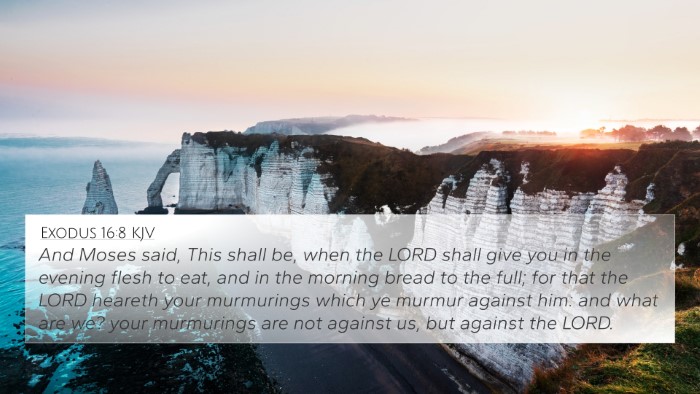Understanding Acts 26:15
Acts 26:15 recounts part of the Apostle Paul's defense in front of King Agrippa, where he describes his encounter with Jesus on the road to Damascus. The verse states:
"And I said, Who art thou, Lord? And he said, I am Jesus whom thou persecutest."
This pivotal moment signifies a transformation in Paul's life, revealing deep theological implications and connections throughout the Bible. Below is a summary of its meaning based on insights from public domain commentaries by Matthew Henry, Albert Barnes, and Adam Clarke.
Context of the Verse
Acts 26 presents a powerful narrative where Paul is defending his faith and recounting his dramatic conversion experience. He stands before rulers, sharing how he moved from a persecutor of Christians to a fervent advocate for the Gospel. The context emphasizes God's sovereignty in directing Paul’s life.
Verse Breakdown and Meaning
- Paul’s Inquiry: “Who art thou, Lord?” - This reflects a natural human response to divine revelation. It shows humility and reverence as Paul recognizes the authority of the voice speaking to him.
- Jesus’ Revelation: “I am Jesus whom thou persecutest.” - This declaration bridges the relationship between Jesus and His followers. Every act against the church is seen as an act against Christ Himself, demonstrating the unity between Christ and His body, the Church.
Theological Significance
According to Matthew Henry, this verse emphasizes the reality of Christ's resurrection and His ongoing involvement in the lives of believers. The personal revelation of Jesus to Paul showcases grace and sets a precedent for personal encounters with the divine throughout the Scriptures.
Albert Barnes highlights the transformative power of understanding one’s sin, as illustrated in Paul’s response to Jesus. It marks the beginning of repentance and change, crucial themes throughout the New Testament.
Adam Clarke notes that this moment signifies the transition from the Old Covenant to the New, where personal knowledge of Jesus becomes central to a believer’s faith journey. Clarke implies that Paul’s transformation serves as a model for others to follow.
Cross-References
This verse connects deeply with several other Bible verses, showcasing a rich tapestry of themes such as revelation, persecution, and divine calling. Here are 10 important cross-references:
- Matthew 25:40: "And the King shall answer and say unto them, Verily I say unto you, Inasmuch as ye have done it unto one of the least of these my brethren, ye have done it unto me." - This emphasizes the connection between acts against believers and against Christ.
- John 15:20: "Remember the word that I said unto you, The servant is not greater than his lord. If they have persecuted me, they will also persecute you..." - Highlighting the reality of disciples' suffering.
- Philippians 3:6: "Concerning zeal, persecuting the church; touching the righteousness which is in the law, blameless." - Paul recognizes his former zeal as a source of pride before encountering Christ.
- Romans 8:1: "There is therefore now no condemnation to them which are in Christ Jesus..." - Illustrating Paul’s transformation from condemnation to grace.
- 2 Corinthians 5:17: "Therefore if any man be in Christ, he is a new creature..." - Reflecting the radical change in Paul’s life.
- Galatians 1:13-14: "For ye have heard of my conversation in time past in the Jews' religion, how that beyond measure I persecuted the church of God..." - Paul recounts his transformation, paralleling his experience in Acts 26:15.
- 1 Timothy 1:13: "Who was before a blasphemer, and a persecutor, and injurious: but I obtained mercy..." - Emphasizing God's mercy towards Paul despite his past.
- Acts 9:5: “And he said, Who art thou, Lord? And the Lord said, I am Jesus whom thou persecutest: it is hard for thee to kick against the pricks.” - Paul's earlier account of his encounter on the road to Damascus.
- Luke 10:16: "He that heareth you heareth me; and he that despiseth you despiseth me..." - This ties directly to the idea of connection between Christ and those who follow Him.
- Revelation 1:18: "I am he that liveth, and was dead; and, behold, I am alive for evermore..." - Affirmation of Christ's living presence, impacting Paul’s encounter.
Conclusion
Acts 26:15 encapsulates a critical moment in Christian history, where Paul's identity is redefined by his encounter with Christ. The interplay of revelation, repentance, and divine calling emphasizes the importance of understanding this verse in the broader context of New Testament theology. By linking this text with other biblical passages, we unveil a network of themes that encourages deeper study and cross-referencing. Through these insights, one can appreciate the profound implications this verse holds for understanding the nature of Christ, the essence of the Christian faith, and the transformative power of God's grace.
Tools and Resources for Cross-Referencing
For those interested in further exploring the connections between various Bible verses, we recommend utilizing the following:
- Bible Concordance: A tool to locate specific words and their occurrences throughout the Bible.
- Bible Cross-Reference Guide: A resource that lists related verses for deeper analysis.
- Cross-Reference Bible Study Methods: Techniques to draw thematic and narrative connections between different scripture passages.






